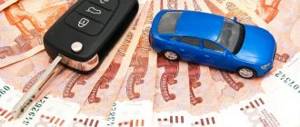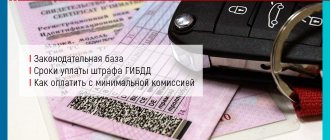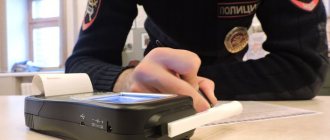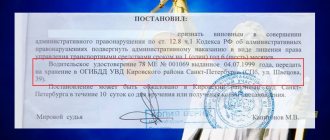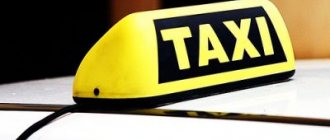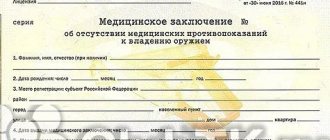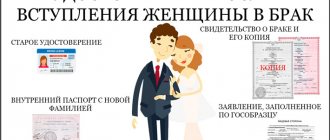What is the deadline for paying a fine of 30,000 rubles?
The imposed administrative fine of 30,000 rubles must be paid no later than 60 days from the date of entry into force of the court decision. The resolution comes into force 10 days from the date of its adoption.
If the order is not served due to the absence of the addressee at the place of residence, then it is considered served from the moment the postman’s notification is returned to the court. The time limit is not affected by the fact that the decision was served. But failure to receive a resolution may serve as a valid reason for requesting a deferment or installment plan.
The fine for deprivation of rights of 30,000 rubles is not subject to “lenient” conditions with a 50% discount. Therefore, if you think that you can pay a fine for deprivation of rights at a discount in the first 20 days or even immediately after issuance, you are deeply mistaken. The amount must be paid in full, otherwise the collection will not be considered repaid.
How can I extend the deadline for paying a fine?
However, a situation often arises when the car owner simply does not have the financial ability to pay the fine. The question naturally arises: what will happen if you don’t pay a traffic police fine of 30 thousand rubles? It makes no sense to evade payment of a monetary penalty, as it will have to be paid in any case. To help citizens in such cases, the law provides for the option of deferring payment for 30 calendar days.
To obtain it, a motorist needs to contact an experienced lawyer and draw up a corresponding application.
Thus, the citizen will show that he is not going to evade payment, but simply does not know how to pay the traffic police fine of 30,000 rubles for deprivation of his rights. But to confirm this, you need to provide the court with documents indicating the financial condition of the car owner (for example, a certificate of income).
Please note that there are no discounts for drunk driving fines.
What happens if you don't pay the fine on time?
For defaulters who are late in paying the fine imposed upon deprivation of rights, the punishment is more than severe.
If within 60 days from the date of entry into force of the resolution the amount of funds does not go to the budget, then after about 5-10 days the documents will be transferred to the FSPP for forced collection and application of other sanctions. The bailiffs will “spin” the proceedings in 10 days, and now a number of even more serious problems are hanging over the debtor.
Additionally, in case of prolonged failure to pay an administrative fine, the defaulter faces:
- Collection of an enforcement fee from him in the amount of at least 1,000 rubles;
- Imposition of an administrative penalty under Art. 20.25 of the Code of Administrative Offenses of the Russian Federation for failure to pay a fine on time, which is either double the fine or 15 days of arrest at the discretion of the judge, taking into account the opinion of the defaulter. However, this does not exempt you from paying a fine of 30,000 rubles!
- Optionally under Art. 20.25 of the Code of Administrative Offenses of the Russian Federation, compulsory labor for up to 50 hours may be imposed instead of arrest or a double fine.
- Restriction of travel abroad, which will not have the most pleasant effect on your planned and already prepaid vacation.
- It is impossible to get a driver's license back if the period of deprivation has expired, but the fine has not yet been canceled.
Note: Often those who fail to pay fines end up in real bondage. First, they were given a fine of 30,000 rubles. Then the fine doubles to 60,000 rubles. And then, if 60,000 rubles are not repaid, the defaulter is again charged at 20.25 and another double fine is imposed. So, in six months, the amount of debt to the state can increase from 30 to 200 thousand rubles.
The police, however, do not shy away from setting up drivers to get a fine:
Implementation of punishment for drunk driving
| № | Action | A comment |
| 1 | Making a decision | The amount in 2021 is 30,000 rubles |
| 2 | Entry into force of the decision | After notifying the driver. As a rule, the letter is delivered within 11 days |
| 3 | Allow 60 days for payment | If you do not apply for an installment plan or deferment, this will be the maximum period for repayment |
| 4 | Transfer of a resolution for forced collection of debt | 10 days after 2 months - the period during which the court decision is sent to the executive service |
| 5 | Initiation of proceedings | A protocol on non-payment of the sanction on time must be drawn up, which is forwarded to the magistrate for issuing measures for non-payment. This is Art. 20.25 Code of Administrative Offenses |
Common Myths
An insufficiently high level of legal literacy, the formalism of court workers and the low qualifications of various novice car lawyers have led to the birth of many myths about how not to pay a fine of 30,000 rubles or what the consequences of this are.
We will try to destroy the most popular of them in order to help drivers who violate traffic rules avoid even more unpleasant sanctions.
You don’t have to pay a fine for drunkenness, the bailiffs will issue an arrest and that’s it!
Complete nonsense. Firstly, bailiffs do not issue an arrest - this is the competence of the court. Secondly, being charged under 20.25 of the Code of Administrative Offenses of the Russian Federation for non-payment of a fine does not relieve one from the obligation to cover this same fine, and at the same time a new one - it can also be imposed.
In addition, the arrest is not given at the request of the defaulter (although this is also taken into account), but taking into account the circumstances of his case.
If a fine of 30,000 rubles is not paid on time, arrest is imposed:
- Persons who do not have a regular income and are unable to cover a repeated fine;
- Persons without permanent residence;
- In exceptional cases, taking into account the position of the defaulter.
However, arrest will not be granted if the person who has not paid the fine has health problems that preclude serving the fine. Also, arrest for failure to pay a fine of 30 thousand rubles is not imposed on pregnant women and minors.
You don’t have to pay a fine of 30,000 rubles, but after two years the statute of limitations will expire
Yes, there really is a deadline for collecting a fine - it is 2 years. Two years have passed and recovery is impossible.
But for these 2 years, the debtor’s life will turn into hell, because in addition to the sanctions under Art. 20.25 of the Code of Administrative Offenses of the Russian Federation (which also need to be paid, served time or worked!), bailiffs can seize accounts, a car, other property and put it up for auction.
In the conditions of modern Russia, it is impossible to get lost for 2 years with an unpaid fine just to avoid paying it.
You can pay 30,000 in installments, even if the term has expired
Possibly before the maturity date. Then, in any case, the bailiffs will open a case for non-payment of the fine (yes, yes, again 20.25 of the Code of Administrative Offenses of the Russian Federation) and impose a double fine of the unpaid amount.
IMPORTANT : Do not forget about the human factor - every 5th fine is “lost” in the web of the banking system, and the payer has to prove his case with receipts and running around the authorities. And multiple transfers in parts do not guarantee that they will reach the recipient.
Statute of limitations for fines for deprivation of rights
The statute of limitations for collecting fines is determined by 31.9 of the Code of Administrative Offenses of the Russian Federation, and for those punished under Art. 12.8 of the Administrative Code is 24 months. There is a misconception that after two years the driver is exempt from paying.
The statute of limitations for drunk driving penalties depends on whether the penalty order was enforced. If the fined driver evaded payment and enforcement proceedings were initiated against him, the two-year statute of limitations is suspended while the evader is being searched for.
We talked in detail about what will happen if you hand over the steering wheel to a person without a license in this article.
Is it possible to return your license after deprivation without paying a fine of 30,000 rubles?
No you can not. The administrative regulations for issuing driver's licenses after deprivation of rights, as well as the provisions of the administrative code regarding the execution of penalties in the form of a fine, prohibit the return of a license to a driver who has not paid the fine.
Auto photo: Ärzte Zeitung
You can take an exam on your knowledge of traffic rules, collect all the papers, but if the fine of 30,000 is not paid, you cannot return your license until it is paid in full. Judicial practice in this area is clear: there are no cases of forcing the traffic police to issue a license if the driver has not paid 30,000 rubles.
If there is no money to pay the fine, what should you do?
Are you given a fine of 30,000 rubles, but you don’t have the money to pay it? This will not save you from having to contribute your hard-earned funds to the state. But you can ask the court for a deferment or installment plan for the execution of the penalty in the form of a fine.
The financial situation of many drivers does not allow them to easily and without damage to the budget pay the thirty thousand fine imposed upon deprivation of their license. But hiding from recovery and waiting for new sanctions is not an option. The possibility of deferment or installment payment of the fine, regulated by Art. 31.5 Code of Administrative Offenses of the Russian Federation.
Deferment of a fine is a shift in the deadline for payment of a fine by the requested period of time or by a court decision. In practice, the duration of the deferment hardly exceeds 60 days, which, in addition to the two months already available by law, helps many drivers avoid unnecessary sanctions and overpayments.
Installment payment of a fine is a schedule established by the court for repaying a fine of 30,000 rubles in installments. Approximate or clear repayment dates are set by the court at its discretion, but taking into account the position of the person fined. The maximum duration of the installment plan usually does not exceed 90 days, but in the most exceptional cases the court may (but is not obliged!) agree to a meeting and establish a longer payment period.
Deadlines for payment of fines upon deprivation of rights
In accordance with the Code of Administrative Offenses of the Russian Federation, the deadline for paying a fine for an offense is 60 days from the date the resolution comes into force. To this it is worth adding 10 days, which are provided by law for appealing the decision. The same article provides for a 50% discount within 20 days from the date of the decision. However, the discount does not apply to all offenses. The discount does not apply to payment of fines under articles related to drivers deprived of their license for alcohol or drug intoxication. The bailiff service will carry out work on the outstanding offense 70 days after the decision is issued (60+10 days). FSSP employees will send a request to the bank about the availability of accounts, the amount of money in them and with a request to withdraw from the accounts an amount equal to the fines imposed in favor of the state.
Is it possible and how can I get a deferment or installment plan for a fine of 30,000 rubles?
Yes, you can. A person who has been brought or has already been brought to administrative responsibility has two options for obtaining a deferment or installment plan for the fine:
- In court when making an administrative decision . If you admit guilt or understand that punishment cannot be avoided, apply for an installment plan or deferment of the fine. The judge will most likely grant it if you have extenuating circumstances and they deserve leniency.
- After the resolution comes into force . If you understand that you cannot pay the fine within the legal 60 days, contact the same court with a request for a deferment or installment plan. If it is refused, the court verdict can be appealed to the district court. Also, an application can be submitted after the expiration of the 60-day period prescribed by law.
They don’t just give a deferment or installment plan for a fine. You need good reasons for not paying the thirty thousand fine on time, and the person held accountable will have to prove them.
In each case, the evidence is individual. Below are examples of typical circumstances:
- Having other fines, debts or loans. Confirmed by relevant certificates and other documents. In this case, the court will pay attention to the real need for these loans. If, for example, after the ruling was made, an expensive phone was purchased on credit, the court is unlikely to consider this a reasonable basis.
- The presence of dependents, the need for additional funds for them. Is your child or wife on maternity leave sick? Provide medical documents, family composition certificates and information about current expenses.
- Unforeseen and difficult life circumstances: job loss, serious illness, accident. All this needs to be documented.
- Lack of a permanent source of income. A certificate from your last place of work, a copy of your employment record, or information from the employment center about your registration are suitable as evidence.
- A difficult financial situation caused both by specific circumstances and by a generally low level of income.
IMPORTANT : Remember that installment or deferment is not the obligation of the court, but only the right to help the offender pay the fine. If you have 10 loans for meaningless purposes, then the court is unlikely to take your side and give you additional time to pay the fine.
Penalty in installments
The plenum of the Supreme Court of Russia explained the subtleties of punishing criminals.
Is it possible to pay a fine in installments? If you are tired of being on a strict regime, how can you change it to a softer one? When can a suspended sentence become real? The answers to these pressing questions are found in the resolution of the plenum of the Supreme Court of Russia “On the practice of courts’ application of legislation on the execution of sentences,” which is published today by Rossiyskaya Gazeta.
Recently, the state’s criminal policy has been changing: the emphasis is on alternative punishments, for example, fines, compulsory labor, and restriction of freedom. But how can we ensure that the punishment remains a punishment, even if the person is not sitting? After all, even a light punishment should still be noticeable so that it reaches the head.
This year, multiple fines were introduced for bribe-takers instead of prison. The idea is good: to hit corrupt officials where it hurts most—their pockets. If the punishment will ruin you, why are these bribes needed at all? However, as was said during the discussion of the resolution, even at the old rates, criminal fines were collected very poorly. For example, over six months of 2011, the courts imposed more than 735 million rubles in fines as the main punishment. Of these, a little over 203 million 431 thousand were paid voluntarily. Another almost 63 million fine rubles were collected forcibly. Question: where is the rest of the money?
Theoretically, if a finer does not pay, his punishment should be replaced with a more severe one, say, prison. True, according to the law, the fine officer can ask for an installment plan. As stated in the resolution, the court verifies the arguments of the convicted person that it is impossible for him to pay the fine at a time. For this purpose, it is necessary to hear the explanations of the convicted person, other persons involved in the case, the opinions of the bailiff and the prosecutor, and the presented materials are examined. The decision to approve the application for installment plan specifies the duration of the loan and the amount of monthly payments.
A person sentenced to correctional labor can also ask for financial leniency. As the Supreme Court explains, a deterioration in the financial situation of a convicted person can be evidenced, for example, by material costs incurred by him in connection with illness or injury of both the convicted person and a member of his family, the birth of a child, or the appearance of other dependents on the convicted person. In addition, he may refer to the collection of alimony from him, a reduction in wages, destruction of property, or damage to the convicted person and his family as a result of a fire or natural disaster. The decision to reduce the amount of deductions is made by the court taking into account all the income of the convicted person.
Application for deferment or installment payment of a fine
An application to defer the execution of a fine or to provide an installment plan for its payment is drawn up in free form to the court that issued the decision. It must indicate:
- Name of the court where the document is filed;
- Your full name, residence and registration address;
- Circumstances of the case: when the decision to impose a fine was made, what was the deadline for its payment;
- Objective reasons why the fine cannot be paid on time;
- Links to evidence;
- A request for deferment or installment plan indicating the date or schedule for repayment of the debt;
- Personal signature and date of signing the application.
The document must be accompanied by all documents confirming that you are not paying a fine of 30,000 rubles for valid reasons. Such a petition is not subject to duty and is considered no later than 10 days from the date of its receipt by the court.
What to do if the fine of 30,000 is overdue?
The expiration of the period does not prevent the involved person from exercising his right to receive an installment plan or deferment. If a case under Article 20.25 of the Code of Administrative Offenses of the Russian Federation has already been initiated, there is a chance to justify yourself a little before the court by providing a full set of evidence that the reasons for non-payment of a large fine are valid.
The same reasons as for obtaining an installment plan or deferment will be used as evidence.
IMPORTANT : The court will not close the proceedings in the case of non-payment of a fine of 30,000 rubles, but will be able to impose a minimum punishment - for example, a couple of days of arrest or several hours of compulsory labor. In any case, the initial fine will need to be paid and the sooner the better.
Exception : If the decision to impose a fine is not received by the violator for reasons beyond his control - business trip, illness, military service. In this case, there is a chance not to be held accountable with the provision of further installment plans or deferment on a separate appeal.
Consequences of failure to pay a traffic police fine in 2021
If an administrative penalty of 30,000 rubles is not paid within the established period, within 10 days, employees of the State Traffic Inspectorate or the court send a second copy of the resolution imposing a fine to the Federal Bailiff Service.
The bailiffs open a case of enforcement proceedings against the defaulter. A writ of execution is prepared, on the basis of which the property and accounts of the offender can be seized.
Consequences of enforcement proceedings in 2021:
- seizure and sale of property at auction;
- arrest, blocking of bank accounts;
- ban on traveling abroad. Possible only by court decision;
- problems in obtaining credits and loans;
- when selling property, part of the funds may be withdrawn to pay off the debt;
- problems when finding employment in credit organizations or state, municipal institutions and bodies.
Paying off administrative debt in 2021 will help avoid the negative consequences of enforcement proceedings.
In 2021, only the executive service, that is, the bailiff service, is responsible for collecting debts on traffic police fines. Collection agencies, other organizations and persons do not have the right to do this.
